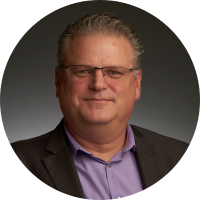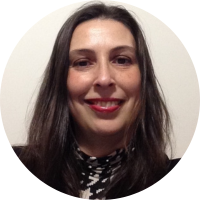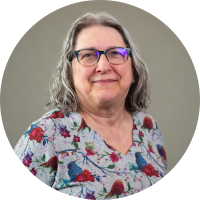With just 65 members in this cohort of distinguished professionals, the Master Communicator (MC) designation is the highest honor IABC Canada can bestow on a member. It recognizes a person’s body of work to advance the profession, their ability to uphold the Global Standard and their contributions to IABC.
We asked the four newest members of this group how their work has helped raise the standards of communication in Canada, what wisdom they have for others aspiring to achieve this recognition and what they love most about their chosen profession.
Given that the MC designation recognizes communications professionals who have demonstrated excellence in their work, what behaviors or attitudes have most helped you?
 Brent Carey, ABC, MC: I value my versatility. I’ve run the gamut of communications functions, but they all fall into three categories that you need to constantly build on: tactical skills, strategic planning and breadth of experience. I also pride myself on being the best listener there is. Listening is a skill that’s often underrated.
Brent Carey, ABC, MC: I value my versatility. I’ve run the gamut of communications functions, but they all fall into three categories that you need to constantly build on: tactical skills, strategic planning and breadth of experience. I also pride myself on being the best listener there is. Listening is a skill that’s often underrated.
 Marie-Soleil Pepin, MBA, SCMP, MC: I’m a no-nonsense communicator. Get to the point. Aim for impact. Cut through the noise. Also, I avoid doing things a certain way just because that’s the way it’s always been. I try to bring a fresh eye and look for original ways to get the job done.
Marie-Soleil Pepin, MBA, SCMP, MC: I’m a no-nonsense communicator. Get to the point. Aim for impact. Cut through the noise. Also, I avoid doing things a certain way just because that’s the way it’s always been. I try to bring a fresh eye and look for original ways to get the job done.
 Paula Bernardino, MCM, CSR-P, SCMP, MC: I’ve always been driven by my curiosity, my passion. In this business, you must constantly learn and stay up to date.
Paula Bernardino, MCM, CSR-P, SCMP, MC: I’ve always been driven by my curiosity, my passion. In this business, you must constantly learn and stay up to date.
 Sue Ridewood, ABC, MC: My attitude is full speed ahead. Don’t sit back and wait for opportunities to come to you. Go looking for things that interest you and follow them. Enter awards, seek out volunteer opportunities and, when you go to work, give it everything you’ve got. Also, I strive to become a trusted advisor to whoever I’m working with. That takes time, consistency and relationship-building.
Sue Ridewood, ABC, MC: My attitude is full speed ahead. Don’t sit back and wait for opportunities to come to you. Go looking for things that interest you and follow them. Enter awards, seek out volunteer opportunities and, when you go to work, give it everything you’ve got. Also, I strive to become a trusted advisor to whoever I’m working with. That takes time, consistency and relationship-building.
What advice can you offer to someone who aspires to strengthen areas of experience that are central to the award criteria?
Carey: Having career longevity and demonstrating accomplishments in each of the judging areas are necessary, but you don’t have to be an absolute rock star in all five categories. For example, not being a high-profile, regularly called on speaker doesn’t mean you don’t qualify in that area or that you can’t get some experience. Don’t let the lack of something relative to others be a barrier.
Pepin: I think a lot of people assume they don’t have enough experience or they’re not as good as this other person, but that’s often not true. A lot of communicators are closer to being ready than they realize. You must identify your achievements and strengths, then get out there and enhance the areas that need it.
Bernardino: It’s about raising your hand and looking for opportunities to share and grow your expertise, starting with a professional association like IABC. Let people know you are available, interested and what your areas of expertise are. Build your comms careers by speaking at conferences, writing articles for LinkedIn or IABC or doing some unpaid work for a nonprofit.
Ridewood: Be a continuous learner. Learn from every project, every position, every client, every boss and every volunteer activity. Use the award rubric as a tool for professional development and look for ways to gain the types of experience required. If you can’t do it through your job, find volunteer roles. Lastly, enter every award you can because going through that process makes you committed to strategic thinking.
How do you feel the MC designation enhances your ability to increase recognition of communications as a professional practice, and what is the most significant thing you look forward to doing or sharing?
Carey: I look forward to continuing what I’m doing; focusing on helping others and mentoring and teaching. The MC recognition enables my voice to carry a little further and may give me an “in” to some different audiences.
Pepin: I want to inspire others to work toward applying for their MC and help to make communications as recognized as other professions. For me, it boils down to showing the value of a communicator’s expertise.
Bernardino: I’ve served on various boards, and I’d like to increase my focus on that. I find there’s a need for communications professionals at the board level, being at the table to provide advice from a risk and reputation perspective.
Ridewood: The MC designation provides additional credibility. I’d like to encourage people to get certified, whether it’s their CMP or SCMP. While the MC group is a small one, there are so many people who have the experience and capabilities to become a Master Communicator. Those kinds of things help you gain personal credibility and elevate the profession.
What do you love about working in the communications field?
Carey: The written word was always my passion, and parlaying that into a career has been very rewarding. I love the notion of storytelling as a way of informing, educating and influencing. I also enjoy the variety of work. Communications sees across an entire organization, and you don’t get that in most other corporate functions.
Pepin: I enjoy how communications is so closely linked to an organization’s strategy and performance and how communicators can impact the bottom line.
Bernardino: I like that you have to be curious and stay on top of what’s new. Hot topics, technological changes like AI, it keeps me on my toes. Our business is ever evolving and there are always new ways of doing the job.
Ridewood: I love making clarity out of complexity. No matter the task or project, that’s what we do. I also like knowing that my work makes a difference to an organization. And lastly, I like being part of the IABC community. It’s brimming with capable people who are eager to be cheerleaders, mentors, brainstormers and advisors.
For more information about the Master Communicator Award, visit IABC Canada’s Master Communicator page.
Earn one (1) point toward Global Communication Certification Council (GCCC) recertification for each Catalyst article read. Learn more.
Stephanie ThomasA true word nerd with a passion for writing and storytelling, Stephanie Thomas has over 15 years of communications experience spanning across the energy, not-for-profit and public sectors.